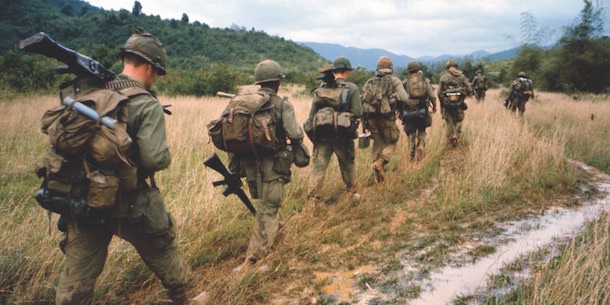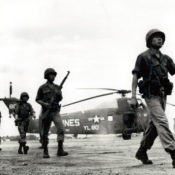The Vietnam War is a subject Americans have “consciously ignored,” says Ken Burns, explaining his interest in developing a series on the conflict. “It’s as if we collectively decided: ‘We don’t want to talk about it. We’re not going to teach it.’”
The filmmaker, who gained national attention and critical acclaim for his documentary explorations of the Civil War and World War II, says this project, which took more than 10 years to complete, is the most ambitious he’s tackled in a career that has included films on everything from baseball to jazz.
Co-director Lynn Novick adds, “No one seems to know much about the Vietnam War, even the experts. I think we just want to avoid dealing with something that is so difficult and extraordinarily painful.”
Burns says his overriding mission was to reopen discussion about a war that so deeply divided our nation. “I’m hoping that seeing how complex it was then might give people the incentive to try and figure out how to have a civil discourse today.”
Ken Burns’ 10-part, 18-hour series, The Vietnam War, premieres on PBS on September 17.
Jeanne Wolf: Your series about a controversial war that we fought and lost several decades ago seems awfully relevant to what America is facing right now.
Ken Burns: We started this project at the end of 2006. If I had told you back then that I would spend 10 years on a film at the conclusion of which the United States would be engaged in asymmetrical warfare, the White House would be obsessed with leaks, there would be a whole bunch of hacked documents revealing that the leaders were doing the opposite of what they said they were doing, and there would be frequent mass demonstrations across the country, you’d say to me: “My god. You’ve abandoned history. You’re talking about the present moment.” All of the divisions we experience today metastasized back in the years of the Vietnam War.
JW: Could remembering how sharp and discordant those divisions were help us find a way toward compromise today?
KB: I think we live in an age of such partisan politics that there’s no in-between. The Vietnam War was all in-between, and maybe it will help us to understand that more than one truth may be present at the same time.
JW: It goes back to the Greeks.
KB: Oh most definitely, and farther than that in a really frighteningly familiar way. We will never learn because human nature has this very quick default switch that goes to war.
JW: The heart and soul of this series are the memorable voices of all the people who lived through the war from both sides and how their lives were changed forever.
Lynn Novick: When I did the interviews, it began to seem that my job was to make grown men cry. I had a moment questioning if this is what we should be doing, having them relive extremely raw and sometimes devastating memories. But in the end I think most of them found it was cathartic to tell their stories.
KB: A lot of the people who spoke to us had never told their stories before — never. In fact, their wives or the people around them would say that they had no idea. It was all bottled up. And it’s different than World War II because everybody was agreed on that war. That one wasn’t a good war, as people would like to believe, but it was a necessary war, and everybody sort of had their oars in the water pulling in the same direction. Vietnam was nothing like that. You went over there alone, and you came back alone. There wasn’t even a possibility for a parade, let alone having a population that would put up with a parade.
JW: What did making this film teach you about the war?
LN: One of the lessons I learned was the understanding of what it means to be brave, what is the definition of courage. The veteran who went on to become an author, Tim O’Brien (author of The Things They Carried, 1990), said that he originally thought courage was charging into enemy bunkers under fire. Then he realized even just getting up and walking out on patrol in Vietnam took courage because you could get blown up at any minute if you took a step in the wrong place, so in that act of walking, you had to be brave.
JW: Do you think a younger generation will watch and have an emotional response?
KB: There’s a graphic moment in the series when an assassination occurs. This particular scene has been shown many times over the years. A man is shot in the head in the middle of the Tet Offensive. My 19-year-old intern came up to us afterwards and said he had grown up with violent images through video games, graphic novels, comic books, and movies. Then he said, “That guy on film is really dead,” and he started to cry. It was a huge moment for us because we tend to think of our kids as being desensitized, but there are moments when you can cut through.
JW: Your series reminds us how complex feelings about war are and how the experience of fighting and killing other human beings stays with you.
KB: There’s nothing in life that compares to combat. Is that shell going to hit you or is it going to hit the guy next to you? You can’t go to combat without it changing you, and you can see some of those veterans start to talk about stuff and their cheeks twitch and their lips tremble. I’m thinking about Karl Marlantes, who appears in our 10th episode, talking about finding himself standing on the hood of a car, trying to kick in the windshield, and not knowing how he got there. He’s an exemplary man, a Rhodes scholar, and an amazing leader who was charging up the hills, inspiring confidence, believing the war was morally wrong but still fighting it anyway, making his mission to get his guys home alive. Yet, back home, he found himself attacking a car one day in a fit of rage because some guy honked at him.
JW: What’s unique about your film is that you don’t dodge the paradoxes inherent in war, and you’re very careful not to place blame.
KB: I think, in the totality of experience, it’s like a big, complicated Thanksgiving. You don’t disinvite Uncle Charlie because you don’t agree with him politically. I’m trying to figure out how to make a Thanksgiving where we can just be together and acknowledge that we have disagreements, but we don’t have to make the other person wrong. The veterans that we’ve brought in and all of the historical advisors that we’ve brought in to screenings were from all across the political spectrum. They loved what they saw. They say that maybe it can heal things now. That’s what we hope will happen. The people who watch all 18 hours, I think they’ll say this is a hugely complex topic that was done with an even hand and fairness.
JW: At the end of the day, is this an anti-war film?
KB: I assume every human being who is smart is anti-war. There’s not a mother out there who isn’t anti-war, so that’s half the population, and every soldier I’ve ever met is anti-war. It’s only when you abstract war does it somehow get covered with the barnacles of sentimentality.
JW: Did you feel a lot of pressure to get it right?
KB: I spend all of my time ferociously pursuing facts.
We love getting it right and figuring out a way to communicate a whole mountain of stuff without making it boring or didactic and not giving advocacy to any one point of view. For instance, it’s easy to make an enemy of Richard Nixon. It’s easy to make him the buffoon, but there are many times when he is brilliant — and we say so.
JW: But Nixon knew the war wasn’t winnable.
KB: Truman knew. Eisenhower knew. Kennedy knew. And Nixon knew even more than anybody. Johnson is the most tragic character in a Shakespearean sense because his whole reason for existing is to be the reincarnation of Franklin Roosevelt. He’s going to transform the domestic agenda. He’s going to have a new “New Deal,” The Great Society. But it’s this thing that he doesn’t know about in foreign policy that’s nipping at his heels, so he keeps all of Kennedy’s guys, and it’s Kennedy’s guys who push him into the Vietnam War — with his agreement; I’m not going to let him off the hook — that’s tragedy.
JW: There was no clear objective.
KB: Right. War is a real estate business. They’d take a hill then leave a hill only to have to take it again. Nobody wants to get wounded in the same place twice.
JW: We’re still doing this in Afghanistan. We don’t know the terrain. And, as in Vietnam, we don’t understand the culture.
KB: And we’re not taking any real estate. We’re going in and getting the bad guys, then leaving. All the bad guys have to do is retreat and then go back where they were.
JW: Did we learn anything from our experience in Vietnam?
KB: We learned one lesson: We’re never going to blame the warriors again. Unfortunately, with many of the lessons, the policymakers quickly forget, so by the time you get to Afghanistan or Iraq, people have forgotten, and you get mired.
JW: What was your own experience with the war?
KB: In the last year of the war, I had a high draft number, but I remember growing up with it from my early teens. It was something you read about in the paper and saw on TV every night. My father was very against the war, but I remember watching the news at night and always rooting that American causalities would be less than the Viet Cong.
JW: Did you, like some people who didn’t go, have guilt?
KB: I don’t necessarily feel guilt, but I certainly am stung and was, during the entire production, humiliated really, by how much we didn’t know — how much we think we know about Vietnam that we don’t know.
JW: There have been previous documentaries about Vietnam. How did you make yours different?
KB: Most documentaries are advocacy pieces, political things. They preach only to the choir and congregation. I am interested in speaking to all Americans — Americans that come from a different part of the country than me, Americans that have different educational backgrounds than me, people who might have voted for a different person than I did. What I see in the story of my country is the difference between what we say we are about and what we are actually about. For example, we believe all men are created equal, but the guy who wrote that, Thomas Jefferson, owned more than 100 human beings, and he didn’t see the contradiction. What drives me to spend 10 years on a project is the wish to say, “Look. This is our shared past. Let’s look at it honestly and learn from our mistakes.”
JW: Here’s the dilemma. Even with the lessons of history, aren’t we doing it all over again?
KB: We’re fond of saying “history repeats itself.” I don’t believe that. I like what Mark Twain said: “History doesn’t repeat itself, but it rhymes.” I’ve spent my entire professional life trying to listen to the rhymes.
Jeanne Wolf is the Post’s West Coast editor. Her last piece for the magazine was an interview with First Amendment lawyer Floyd Abrams in the July/August issue.
Become a Saturday Evening Post member and enjoy unlimited access. Subscribe now




Comments
Is the “fact” that there was the war or the reason(s)for that war the truly important issues that are covered? Does the film/article address the issues and period leading up to WWII in terms of how Asia, particularly the ordinary people of Asia were affected by WWII?
I was a small child at the outbreak of WWII; I don’t claim to be knowledgeable … but? Some memories from that period and later experiences raise questions about our correctness and fairness.
That war was brutal! Reports establish that much damage was done by all! Are we going to get the whole picture … warts and all?
I eagerly await the final episodes. I was a Navy civilian employee in Hawaii and on April 11, 1975 my boss requested that I be sent to Saigon on temporary duty. He asked what I would be doing. His boss, who was already in Vietnam said, “I can’t tell you.” My boss said, “Why can’t you tell me. I’m cleared for Top Secret.” He was told, “This is above Top Secret.” Still, my supervisor refused to send me and when the work day ended I went home to dinner. About 7:00 p.m. my boss called and asked how long it would take me to pack and get to the airport. I told him about an hour. He said I have your orders and tickets. When I arrived at the airport I asked him what had changed. He said, “I got a call from the Admiral who said, ‘Get that man’s ass on a plane.'” I arrived on the 13th and learned soon afterward that I was to be liaison between the Defense Attache Office and the Embassy on evacuating our Vietnamese employees and their families. Even the Ambassador knew nothing about this nor did the media. By April 29th, the day I left Saigon by helicopter from the top of a building, we had gotten 40,000 people out on airplanes. Once we had things organized in parallel with the Vietnamese government’s processing, our planes were landing and taking off every 30 minutes, 24 hours a day. This was not in the newspapers as there were no reporters there. They were covering the Embassy.
Great airing of Viet Nam. Hard to watch, but had to.
My husband’s brother, Jerry D. Leak, left for Viet Nam December 17, 1967. He came back MARCH, 1968 in a plastic bag. He got ambushed going through a “friendly” village on February 28, 1968. Why? He was just 20 years old. He was a very kind young man but since he got into a little trouble in Ohio he went to Viet Nam instead of jail or incarceration. I wished he had of gone to jail and so does his brother, my husband, Jim Leak.
Then we lost a son in 1987 to suicide. What a world this is. Linda Leak
PS We watched Ken Burn’s “Viet Nam” I got tears as I know my husband did. He kept looking for his brother’s picture late 1967, early 1968, did not see it.
This was and is the most essential and relevant documentary ever presented. The honesty of all concerned that either went there or say,was a conscientious objector, had relevant reasons for their feelings. But, we learn again that we see and read, doesn’t tell the whole story. But, I also feel, the truth should always be told regardless of who was wrong or might look bad.
An eye-opener on the deeper causes, miss steps and outright incompetence of the national political leadership in DC!! That’s not the story we were getting “up country” in 1968…but as the old GI saying goes, “There’s always some poor SOB that don’t get ‘the word!”